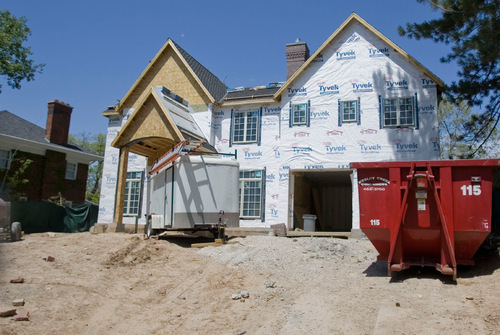This is an archived article that was published on sltrib.com in 2011, and information in the article may be outdated. It is provided only for personal research purposes and may not be reprinted.
Salt Lake City's Yalecrest neighborhood soon may get a new planning commission: the Utah Legislature.
In a lopsided vote Wednesday, a House committee approved Sen. Majority Whip Wayne Niederhauser's one-year moratorium, which would prevent creation of a historic district in the upscale east-bench neighborhood.
The proposed ban now goes to the full House.
A substitute SB243, which already has passed the Senate, initially restricted new historic districts statewide. The latest version applies only to Yalecrest, which was placed on the National Register of Historic Places in 2007.
The bill also would allow demolitions of up to 75 percent of any Yalecrest structure, which critics say could ruin the character of the 1,400-home hamlet, filled with Tudors, Colonials and bungalows.
"This allows for a total of one wall remaining on the side of a house," Yale-crest resident Lynn Pershing scoffed before the City Council on the eve of Wednesday's 9-2 vote.
A handful of residents criticized the council and Mayor Ralph Becker for failing to show more "leadership" on the historic question that has divided Yalecrest for more than a year.
Supporters of the moratorium insist a so-called "pause" is appropriate, saying it would allow future preservation terms to be more clearly defined. They fear a full-fledged historic district would restrict remodels too tightly and hurt property values.
The controversy gripping one of the city's showcase neighborhoods formed over aesthetics and function. Preservationists prefer the former, arguing profit-hungry builders are spoiling Yalecrest's charm with mini-mansions. Property-rights advocates insist the latter is more important, especially for young families hoping for a little more home to grow. Micro-managing dormers, new windows, and attics-turned-master bedrooms they say, would be heavy handed. State lawmakers, often fixated on property rights, seem to agree.
Niederhauser, R-Sandy, who also is a real-estate developer, was approached by historic-district opponents to establish the moratorium. He argues the city's contentious public process — pitting neighbor against neighbor — was flawed.
Even so, preservationists call it hypocritical for a state Legislature that bemoans federal interference to impose law on a local neighborhood.
"This may be a first in Utah state history that the Legislature is trying to interfere with a tiny neighborhood in Salt Lake," said Yalecrest resident Jan Hemming, labeling the state's real-estate lobby a machine. "We'd have to get some major defections from the Republican Party to stop the bill."



